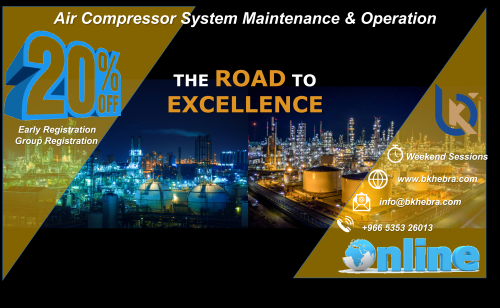| Training Code | Date | Duration | Venue | Fees |
|---|---|---|---|---|
| Keep following, we are updating our training schedules. | ||||

Air Compressor maintenance operator is a person trained to set it in motion, and to ensure both the air compressor and its accessories work and maintain it. Air compressor is a pneumatic machine which transforms mechanic energy into compressed air energy, while the pneumatic engines does vice versa. There are several types of compressors, such as piston compressor, scroll compressor, rotary screw compressor, etc. An hour upon setting it to motion, the operator should check the tightness of the cylinder head bolts, and tighten them if necessary. This check is performed every 200 to 300 working hours.
He cleans the pump filters, and replaces them when needed. Also, after a certain time has passed, he needs to open the air tank valves in order to let off steam. If the compressor has been working non-stop, steam should be let off every 4 to 6 weeks. Oil check and change is also crucial, the first one after 100 working hours, and later on, every 300 to 500 working hours. Air filters are checked once a year, though if extremely clogged, they must be replaced.
This 3-days B’Khebra’s Air Compressor Operation and Maintenance will train candidates the appropriate operation, maintenance and usage of a high and low air compressor (HP/LP). Those compressors can produce and provide breathing air to divers, through their regional integrated systems, such as filters, gas management panel, relief valves, pressure gauges, switches, connectors, flexible tubes, etc.
Upon successful completion of this course, the delegates will be able to:
On successful completion of this training course, BK’s Certificate with eligible Continuing Professional Education credits (CPE), will be awarded to the delegates , one CPE credit is granted per 50 minutes of attendance.